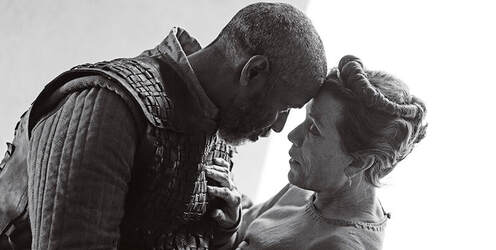A | The Thane of Glamis sniffs out a pathway to the kingship. Directed by Joel Coen Starring Denzel Washington and Frances McDormand Review by Jon Kissel |

These are old cinematic traditions to bring to modern audiences, to say nothing of Shakespeare’s dialogue itself. Black and white cinematography, a compressed frame, hard to understand dialogue, spare production design, lots of tight close ups and silhouettes, all of that sounds like ingredients of a film that’s standoffish, if not impenetrable and cold. Instead, the opposite happens. The Tragedy of Macbeth is alive, as surely as Passion of Joan of Arc or Au Hasard Balthazar or First Reformed is alive. This is a story about agony and despair, about regret and shame, and it affected me on a raw level. Coen taps into unique scenarios embedded in Macbeth that other adapters might shift focus on or ignore altogether. The unpredictable danger of being subject to the whims of a deranged leader are as terrifying here as any horror film. The pain of being the messenger rings through, as characters are repeatedly shown to hold the keys to a crux in the recipient’s life that will hereafter separate it into before and after. Coen’s adaptation is a formal exercise that looks like homework to the average moviegoer, but the assignment is rich and larded with everything that makes film such a rewarding medium.
A career spent making great film after great film means that a director can just attract the most talented people to themselves, and so much of Tragedy of Macbeth is seeing various craftspeople as kings and queens of their respective hills. Delbonnel shoots the unquestioned best-looking film of 2021, and he does it in black and white that looks impossibly crisp. The use of shadow and light serve as their own barriers within the frame, further isolating or accentuating the characters. That being said, the production design of the various white marble castles lends itself to framing, as so much of it is sharp corners and clean surfaces. Macbeth sleeps on a slab without a pillow, and that tells me about all I need to know of his character. The score, by Coen regular collaborator Carter Burwell, is sparse but effective alongside a top-notch sound design that emphasizes the knocking that’s in Macbeth’s head and every strange sound the witches make.
With the construction and capturing of all this, the actors come in to elevate it further still. Denzel Washington and Frances McDormand can tick these required roles for great actors off their lists. He plays Macbeth before the murders as competent and assured, like a classic Denzel character, but his decompensation as his guilt devours him is something new and deranged that, at times, out-villains his role in Training Day. McDormand’s great accomplishment here is conveying the stress of holding down the fort, and watching herself fail to do so. There’s no coming back when your husband embarrasses himself like he does here, and these small changes in McDormand’s face bring that across. As Macduff, Corey Hawkins is revelatory. As great as they often are, Coen films rarely draw tears, and I never expected an adaptation of a known story to do so, but there’s Hawkins with his world-ending shock at hearing about his family’s fate. Alex Hassell, as the inscrutable Ross, is an actor I’ve never seen before, but his particular silhouette, with his tunic’s long sleeves, always served as the alert that I was about to spend a too-brief scene with a great actor. Lastly, Kathryn Hunter as the three witches gives the performance of the year, a physically indelible turn that’s calculated and considered at every step. A known quantity to me since she played Cleopatra’s body slave on HBO’s Rome, her distinctive husky voice and otherworldly motions are put to unforgettable use. I thought the throat-singing Sardaukar priest in Dune was going to be my most memorable vocal performance for 2021, and then Kathryn Hunter barfed up a finger.
The Tragedy of Macbeth even works as a coherent piece of Coen filmography. So many Coen characters commit to a course of action that dooms them, there’s often a god of the movie watching and punishing characters, and the heightened absurdity of violence is here when one of Macduff’s kids gets thrown off a balcony. Maybe Coen has always been motivated by Macbeth and maybe this adaptation was inevitable. Nothing wrong with borrowing from the best, as surely as future filmmakers will borrow from Joel and Ethan Coen. Who knows what this might’ve looked like if Ethan stuck around? As is, it’s one of the most incredible things either Coen has ever done. A
 RSS Feed
RSS Feed